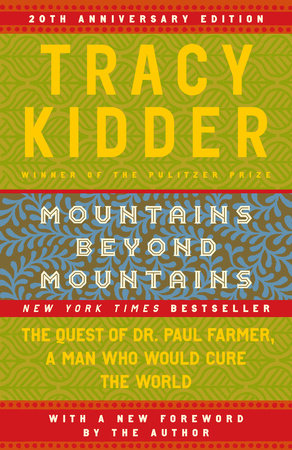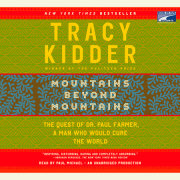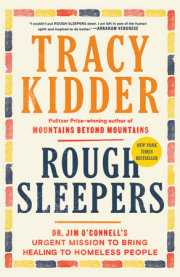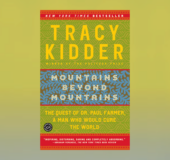Chapter 1Six years after the fact, Dr. Paul Edward Farmer reminded me, “We met because of a beheading, of all things.”
It was two weeks before Christmas 1994, in a market town in the central plateau of Haiti, a patch of paved road called Mirebalais. Near the center of town there was a Haitian army outpost–a concrete wall enclosing a weedy parade field, a jail, and a mustard-colored barracks. I was sitting with an American Special Forces captain, named Jon Carroll, on the building’s second-story balcony. Evening was coming on, the town’s best hour, when the air changed from hot to balmy and the music from the radios in the rum shops and the horns of the tap-taps passing through town grew loud and bright and the general filth and poverty began to be obscured, the open sewers and the ragged clothing and the looks on the faces of malnourished children and the extended hands of elderly beggars plaintively saying, “Grangou,” which means “hungry” in Creole.
I was in Haiti to report on American soldiers. Twenty thousand of them had been sent to reinstate the country’s democratically elected government, and to strip away power from the military junta that had deposed it and ruled with great cruelty for three years. Captain Carroll had only eight men, and they were temporarily in charge of keeping the peace among 150,000 Haitians, spread across about one thousand square miles of rural Haiti. A seemingly impossible job, and yet, out here in the central plateau, political violence had all but ended. In the past month, there had been only one murder. Then again, it had been spectacularly grisly. A few weeks back, Captain Carroll’s men had fished the headless corpse of the assistant mayor of Mirebalais out of the Artibonite River. He was one of the elected officials being restored to power. Suspicion for his murder had fallen on one of the junta’s local functionaries, a rural sheriff named Nerva Juste, a frightening figure to most people in the region. Captain Carroll and his men had brought Juste in for questioning, but they hadn’t found any physical evidence or witnesses. So they had released him.
The captain was twenty-nine years old, a devout Baptist from Alabama. I liked him. From what I’d seen, he and his men had been trying earnestly to make improvements in this piece of Haiti, but Washington, which had decreed that this mission would not include “nation-building,” had given them virtually no tools for that job. On one occasion, the captain had ordered a U.S. Army medevac flight for a pregnant Haitian woman in distress, and his commanders had reprimanded him for his pains. Up on the balcony of the barracks now, Captain Carroll was fuming about his latest frustration when someone said there was an American out at the gate who wanted to see him.
There were five visitors actually, four of them Haitians. They stood in the gathering shadows in front of the barracks, while their American friend came forward. He told Captain Carroll that his name was Paul Farmer, that he was a doctor, and that he worked in a hospital here, some miles north of Mirebalais.
I remember thinking that Captain Carroll and Dr. Farmer made a mismatched pair, and that Farmer suffered in the comparison. The captain stood about six foot two, tanned and muscular. As usual, a wad of snuff enlarged his lower lip. Now and then he turned his head aside and spat. Farmer was about the same age but much more delicate-looking. He had short black hair and a high waist and long thin arms, and his nose came almost to a point. Next to the soldier, he looked skinny and pale, and for all of that he struck me as bold, indeed downright cocky.
He asked the captain if his team had any medical problems. The captain said they had some sick prisoners whom the local hospital had refused to treat. “I ended up buyin’ the medicine myself.”
Farmer flashed a smile. “You’ll spend less time in Purgatory.” Then he asked, “Who cut off the head of the assistant mayor?”
“I don’t know for sure,” said the captain.
“It’s very hard to live in Haiti and not know who cut off someone’s head,” said Farmer.
A circuitous argument followed. Farmer made it plain he didn’t like the American government’s plan for fixing Haiti’s economy, a plan that would aid business interests but do nothing, in his view, to relieve the suffering of the average Haitian. He clearly believed that the United States had helped to foster the coup–for one thing, by having trained a high official of the junta at the U.S. Army’s School of the Americas. Two clear sides existed in Haiti, Farmer said–the forces of repression and the Haitian poor, the vast majority. Farmer was on the side of the poor. But, he told the captain, “it still seems fuzzy which side the American soldiers are on.” Locally, part of the fuzziness came from the fact that the captain had released the hated Nerva Juste.
I sensed that Farmer knew Haiti far better than the captain, and that he was trying to impart some important information. The people in this region were losing confidence in the captain, Farmer seemed to be saying, and this was a serious matter, obviously, for a team of nine soldiers trying to govern 150,000 people.
But the warning wasn’t entirely plain, and the captain got a little riled up at Farmer’s denunciation of the School of the Americas. As for Nerva Juste, he said, “Look, that guy is a bad guy. When I do have him and the evidence, I’ll slam him.” He slapped a fist into his hand. “But I’m not gonna stoop to the level of these guys and make summary arrests.”
Farmer replied, in effect, that it made no sense for the captain to apply principles of constitutional law in a country that at the moment had no functioning legal system. Juste was a menace and should be locked up.
So they reached a strange impasse. The captain, who described himself as “a redneck,” arguing for due process, and Farmer, who clearly considered himself a champion of human rights, arguing for preventive detention. Eventually, the captain said, “You’d be surprised how many decisions about what I can do here get made in Washington.”
And Farmer said, “I understand you’re constrained. Sorry if I’ve been haranguing.”
It had grown dark. The two men stood in a square of light from the open barracks door. They shook hands. As the young doctor disappeared into the shadows, I heard him speaking Creole to his Haitian friends.
I stayed with the soldiers for several weeks. I didn’t think much about Farmer. In spite of his closing words, I didn’t think he understood or cared to sympathize with the captain’s problems.
Then by chance I ran into him again, on my way home, on the plane to Miami. He was sitting in first-class. He explained that the flight attendants put him there because he often flew this route and on occasion dealt with medical emergencies on board. The attendants let me sit with him for a while. I had dozens of questions about Haiti, including one about the assistant mayor’s murder. The soldiers thought that Voodoo beliefs conferred a special, weird terror on decapitation. “Does cutting off the victim’s head have some basis in the history of Voodoo?” I asked.
“It has some basis in the history of brutality,” Farmer answered. He frowned, and then he touched my arm, as if to say that we all ask stupid questions sometimes.
I found out more about him. For one thing, he didn’t dislike soldiers. “I grew up in a trailer park, and I know which economic class joins the American military.” He told me, speaking of Captain Carroll, “You meet these twenty-nine-year-old soldiers, and you realize, Come on, they’re not the ones making the bad policies.” He confirmed my impression, that he’d visited the captain to warn him. Many of Farmer’s patients and Haitian friends had complained about the release of Nerva Juste, saying it proved the Americans hadn’t really come to help them. Farmer told me he was driving through Mireba- lais and his Haitian friends were teasing him, saying he didn’t dare stop and talk to the American soldiers about the murder case, and then the truck got a flat tire right outside the army compound, and he said to his friends, “Aha, you have to listen to messages from angels.”
I got Farmer to tell me a little about his life. He was thirty-five. He had graduated from Harvard Medical School and also had a Ph.D. in anthropology from Harvard. He worked in Boston four months of the year, living in a church rectory in a slum. The rest of the year he worked without pay in Haiti, mainly doctoring peasants who had lost their land to a hydroelectric dam. He had been expelled from Haiti during the time of the junta but had sneaked back to his hospital. “After the payment,” he said, “of an insultingly small bribe.”
I looked for him after the plane landed. We talked some more in a coffee shop, and I nearly missed my connecting flight. A few weeks later, I took him to dinner in Boston, hoping he could help make sense of what I was trying to write about Haiti, which he seemed glad to do. He clarified some of the history for me but left me wondering about him. He had described himself as “a poor people’s doctor,” but he didn’t quite fit my preconception of such a person. He clearly liked the fancy restaurant, the heavy cloth napkins, the good bottle of wine. What struck me that evening was how happy he seemed with his life. Obviously, a young man with his advantages could have been doing good works as a doctor while commuting between Boston and a pleasant suburb–not between a room in what I imagined must be a grubby church rectory and the wasteland of central Haiti. The way he talked, it seemed he actually enjoyed living among Haitian peasant farmers. At one point, speaking about medicine, he said, “I don’t know why everybody isn’t excited by it.” He smiled at me, and his face turned bright, not red so much as glowing, a luminescent smile. It affected me quite strongly, like a welcome gladly given, one you didn’t have to earn.
But after our dinner I drifted out of touch with him, mainly, I now think, because he also disturbed me. Writing my article about Haiti, I came to share the pessimism of the soldiers I’d stayed with. “I think we should have left Haiti to itself,” one of Captain Carroll’s men had said to me. “Does it really matter who’s in power? They’re still gonna have the rich and the poor and no one in between. I don’t know what we hope to accomplish. We’re still going to have a shitload of Haitians in boats wanting to go to America. But, I guess it’s best not even to try and figure it out.” The soldiers had come to Haiti and lifted a terror and restored a government, and then they’d left and the country was just about as poor and broken-down as when they had arrived. They had done their best, I thought. They were worldly and tough. They wouldn’t cry about things beyond their control.
I felt as though, in Farmer, I’d been offered another way of thinking about a place like Haiti. But his way would be hard to share, because it implied such an extreme definition of a term like “doing one’s best.”
The world is full of miserable places. One way of living comfortably is not to think about them or, when you do, to send money. Over the next five years, I mailed some small sums to the charity that supported Farmer’s hospital in Haiti. He sent back handwritten thank-you notes on each occasion. Once, from a friend of a friend, I heard he was doing something notable in international health, something to do with tuberculosis. I didn’t look into the details, though, and I didn’t see him again until near the end of 1999. I was the one who made the appointment. He named the place.
Copyright © 2003 by Tracy Kidder. All rights reserved. No part of this excerpt may be reproduced or reprinted without permission in writing from the publisher.













